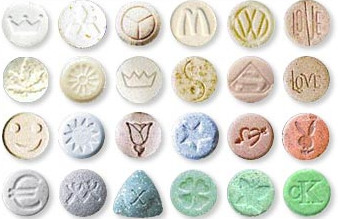Ecstasy Addiction
 Treatment
Treatment
And Abuse Recovery
Ecstasy (also known as MDMA, X, and 3,4-methylenedioxymethamphetamine) is a popular synthetic “club drug” that creates a hallucinogenic effect similar to the “high” that results from mescaline.
According to the National Institute on Drug Abuse (NIDA) the effects of Ecstasy include “energy, euphoria, emotional warmth, and distortions in time, perception, and tactile experiences.”
On the negative side, Ecstasy use has been associated with depression, confusion, panic/anxiety, and sleep problems. Additional negative repercussions of Ecstasy use include convulsions, paranoia, psychosis, and possible long-term cognitive impairments (including memory problems).
Though Ecstasy use can lead to hallucinogenic experiences, the drug is classified as a stimulant.
Ecstasy is also classified as a Schedule I controlled substance by the U.S. Department of Justice. Schedule I substances are those that the U.S. government has determined meet the following criteria:
High potential for abuse.
No currently accepted medical use in treatment in the United States.
Lack of accepted safety for use of the drug or other substance under medical supervision
Ecstasy’s effects are due to the way that the drug interacts with the brain’s ability to create and process serotonin, the chemical that is associated with happiness, pleasure, mood regulation, aggression, and sensitivity to pain. Serotonin deficiencies have been associated with a range of negative effects, including depression.
Ecstasy Abuse
Because of its ability to lower inhibitions, enhance a sense of interconnectedness, and create psychedelic effects, Ecstasy is popular among teenagers and young adults, especially those who visit dance clubs or attend all-night dance parties (known as “raves”).
According to the National Survey on Drug Use and Health (NSDUH), 760,000 individuals age 12 and older reported using Ecstasy in the 30 days prior to the survey, while 1.1 million respondents said they had tried Ecstasy for the first time within the previous 12 months.
Ecstasy and Addiction
Though there is an unfortunately common misperception that Ecstasy does not lead to addiction or dependence, research indicates that users can (and do) become addicted to Ecstasy.
Long-term users of Ecstasy may develop tolerance (which means that they need to ingest increasingly larger amounts of the drug in order to receive the same high that previously resulted from lesser dosages).
Among those who have developed a tolerance and become addicted to Ecstasy, ceasing to use the drug may result in physical and psychological withdrawal symptoms.
Treatment for Ecstasy Addiction
Depending upon a number of factors, including the individual’s age, the nature and severity of the Ecstasy abuse or addiction, and the presence of any co-occurring conditions, the optimal treatment for Ecstasy abuse or addiction may include outpatient therapy, participation in a 12-Step support group, partial hospitalization, or residential treatment.
Treatment for alcoholism may include the following therapies and techniques:
Individual therapy
Group therapy
Family therapy
12-Step education
Relapse-prevention instruction
Cognitive Behavioral Therapy (CBT)
Dialectical Behavioral Therapy (DBT)
Biofeedback & Neurofeedback
Medication management
Anger management
Hypnotherapy
Recreation therapy
Click Here for crchealth.com/addiction/ecstasy-addiction-treatment
